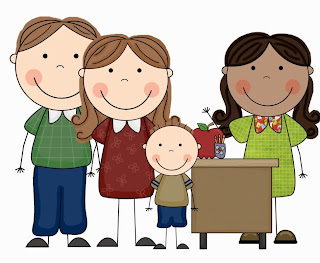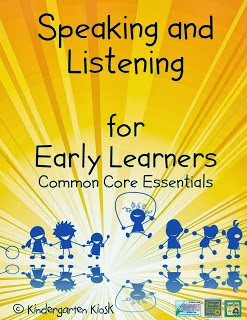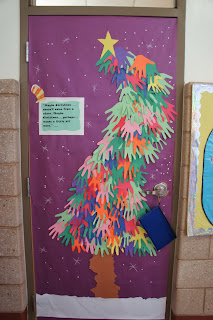
Bring on the Snow

Labels:
Science
Common Core "Close Reading" in Kindergarten
I am finally one of those teachers, you know the ones that has been teaching so long that they have been there, done that, and roll their eyes knowing the new is simply a proven method back again with a different name.

My comment today is about the “Hype” of Close Reading that has been boosted by the Common Core Standards. It seems as it is being touted as a new idea. However, veteran (okay I mean old) teachers know that close reading is simply a new name for “Shared Reading.” You know the great shared readings that was promoted by Bobbie Fisher and other Whole Language (okay I know this is now a bad word) greats of the 1990s. These proponents of reading text closely, with purpose, using the “think aloud model” as the teacher “closely” looks at a book, brought books quickly to life for young readers.
So today as I taught my Common Core objectives for reading literature to children, I simply enjoyed a great Shared Reading lesson with my students.
We read the book “One Cold Wet Night” by Joy Cowley and June Melser (yes I have owned that book for almost two decades now and I have yet to see a child not love it). After closely taking a “picture walk” (or using todays term) looking for visual clues we read the story three times with different objectives at each reading.
Next we made a story map recording all of the elements in the story. Then, the students recorded the elements in their journal.
Yes, Ruth and Melba were right (the veterans of my early career). Good teaching is good teaching no matter the name.

Labels:
Common Core,
Shared Reading
Guided Reading in Kindergarten or PreK
Guided Reading is an important part of the literacy spectrum as it is a time to work with students of similar needs and abilities using material at their instructional level. It is a time to introduce and practice important reading strategies, build one to one correspondence, to practice the importance of rereading text, and more.
If you are like me and find the guided books in your basal series to be marginal at best, you need something more. I have been making thematic books for several years now, and find they fit the bill for effective guided reading. I have several sets for sale at our on-line store, they are moderately priced. My students love these little books! I usually sent home two a week.

If you are like me and find the guided books in your basal series to be marginal at best, you need something more. I have been making thematic books for several years now, and find they fit the bill for effective guided reading. I have several sets for sale at our on-line store, they are moderately priced. My students love these little books! I usually sent home two a week.

Labels:
Guided Reading
Preparing For Parent Teacher Conferences

Do the Finn's have it right?
More from my "Early Childhood" Soapbox
Children in Finland go outside to play frequently all day long. "How can you teach when the children are going outside every 45 minutes?" a recent American Fulbright grant recipient in Finland, who was astonished by how little time the Finns were spending in school, inquired curiously of a teacher at one of the schools she visited. The teacher in turn was astonished by the question. "I could not teach unless the children went outside every 45 minutes!"
The Finnish model of education includes a late start to academics (children do not begin any formal academics until they are 7 years old), frequent breaks for outdoor time, shorter school hours and more variety of classes than in the US. Equity, not high achievement, is the guiding principle of the Finnish education system.
While we in America preach the mantra of early intervention, shave time off recess to teach more formal academics and cut funding to non-academic subjects like art and music, Finnish educators emphasize that learning art, music, home economics and life skills is essential.
Why it's better: American school children score in the middle of the heap on international measures of achievement, especially in science and mathematics. Finnish children, with their truncated time in school, frequently rank among the best in the world.

Labels:
Early Childhood
Winter Parent and Teacher Conference Reporting Form: Kindergarten
You will love this easy form that will make reporting to parents a breeze! Bonus! This packet
includes Homework Intervention Packets in both English and Spanish. Send these packets home with parents to offer additional support for their child's academic learning.


Every Child Deserves a Developmentally Appropriate Education
Yesterday while listening to the radio a commercial for a local school came on the air, this was there selling point:

Excuse me while I tear my hair out. Setting aside the fact that there is no research or evidence to show that early reading has any kind of tie to academic success, is this really what we want for our children? There was a time when early education was about learning to play, about exploring one's environment, about painting, and singing, and growing socially and emotionally. When did we decide that this kind of learning wasn't important anymore? When did we decide that pushing strict academics on younger and younger children was the most important thing? And in this world of children who are lost, who are bullied or bullies, who are lonely, who are struggling, can we really say that we are better for it?
I think this story told to me by a friend, using her words, sums things up nicely:
 "I have a lot of friends that have kids in preschool and kindergarten and their biggest focus is their kid's knowing all their letters and sounds and their ability to read at an early age. They talk as if a kid isn't reading by kindergarten they're behind! I went to (_____) School when I was little. That was where I learned I was dumb. It took 'til I was in high school to realize I wasn't. I worked hard and did great. It was hard to be so young and feel like everyone else was so much better than me.
"I have a lot of friends that have kids in preschool and kindergarten and their biggest focus is their kid's knowing all their letters and sounds and their ability to read at an early age. They talk as if a kid isn't reading by kindergarten they're behind! I went to (_____) School when I was little. That was where I learned I was dumb. It took 'til I was in high school to realize I wasn't. I worked hard and did great. It was hard to be so young and feel like everyone else was so much better than me.
 The frustrating thing: We can do both!! We can teach necessary academic skills and do it at the appropriate level for each child and in the appropriate way. Children are only young once and deserve a childhood. They deserve the chance to learn through the guidance of caring adults that value the importance of early childhood education and value the proven developmental techniques of play, scaffolding, and discovery.
The frustrating thing: We can do both!! We can teach necessary academic skills and do it at the appropriate level for each child and in the appropriate way. Children are only young once and deserve a childhood. They deserve the chance to learn through the guidance of caring adults that value the importance of early childhood education and value the proven developmental techniques of play, scaffolding, and discovery.

"Our students read at 3 years old!"
Excuse me while I tear my hair out. Setting aside the fact that there is no research or evidence to show that early reading has any kind of tie to academic success, is this really what we want for our children? There was a time when early education was about learning to play, about exploring one's environment, about painting, and singing, and growing socially and emotionally. When did we decide that this kind of learning wasn't important anymore? When did we decide that pushing strict academics on younger and younger children was the most important thing? And in this world of children who are lost, who are bullied or bullies, who are lonely, who are struggling, can we really say that we are better for it?
I think this story told to me by a friend, using her words, sums things up nicely:
 "I have a lot of friends that have kids in preschool and kindergarten and their biggest focus is their kid's knowing all their letters and sounds and their ability to read at an early age. They talk as if a kid isn't reading by kindergarten they're behind! I went to (_____) School when I was little. That was where I learned I was dumb. It took 'til I was in high school to realize I wasn't. I worked hard and did great. It was hard to be so young and feel like everyone else was so much better than me.
"I have a lot of friends that have kids in preschool and kindergarten and their biggest focus is their kid's knowing all their letters and sounds and their ability to read at an early age. They talk as if a kid isn't reading by kindergarten they're behind! I went to (_____) School when I was little. That was where I learned I was dumb. It took 'til I was in high school to realize I wasn't. I worked hard and did great. It was hard to be so young and feel like everyone else was so much better than me.
That's one thing about this system that is so bad. These kids that are just as smart as everyone else go through school thinking they're dumb because they couldn't read well in kindergarten and first grade.
Because I was given the title "not as smart" I really did stop trying because I felt like I couldn't do it anyway. I don't exactly know what changed in me. I do know there were a number of teachers I had in high school that knew better and expected more of me. I'm sure they played a big part. I actually graduated on the honor roll. It starts young. If only people knew how important it is to build a kid up in those early years. It effects EVERYTHING!!!"

Labels:
Early Childhood
Teaching The Common Core Standard: Speaking and Listening
Are you looking for ways to give students opportunity for collaborative, authentic, and descriptive conversations?

If you've read any of Lyndsey's posts over on Mamma's Tots, you'll know that she believes (as do developmental experts) that the most important skill for young children is the development of their speech and language skills. Children with a large vocabulary and the ability to discuss events, ideas, and feelings clearly are better prepared for literacy than they would be by the study of the alphabet alone. This is because decoding words is only one part of the process of becoming a literate individual. Reading is a way of processing information and ideas, and if children are not already practiced in processing oral information, they will be overwhelmed by the task of processing written information (especially since they will also be learning to decode that information).
The best way to develop a child's language is by talking to them, but so often as parents and or teachers, we get caught up in "informational speech". And of course we do, because so much of a child's needs require "informational speech".
"Don't touch that"
"Go and get dressed"
"Did you brush your teeth?"
But "informational speech" doesn't develop language in the same way the "conversational speech" does. It is "conversational speech" that is the most important for children's learning. And it's the harder kind of speech to engage in because it goes beyond commands and short answers.
"If you could be an animal, what kind would you be? Why?"
"What is your favorite day of the week? Why"
Sometimes it's hard to come up with opportunities for "conversational speech" so we have developed some games and activities to help get young children talking. This packet contains 5 games and 2 activities for speech and language development.

Labels:
Common Core,
Speech
Happy New Year Thematic Unit
Well, lucky me, I do not have to go back to school until Monday the 6th (well officially, I am a teacher after all). When I go back, we will be doing this thematic unit for a couple of days.

This unit focuses on clocks, calendars, and New Years fun. It is always a hit with my students.
Their favorite parts?
They love singing the Hap Palmer song "Paper Clocks."
And, of course, popping their Happy New Year poppers at the end of their guided reading session.

Labels:
New Year,
Thematic Teaching
Sight Word Worksheets or Workbook: Multi-Task Style
Are you looking for easy, effective ways to give those high-frequency words meaning to your students! My students LOVE to do these pages. I have made them workbook style and used as single worksheet pages, they have loved them both the same.
This product not includes 109 sight words. These words include the 100 most frequently used words as well as the Kindergarten words in the Wonders Reading Series.
 |
| Update now includes 109 words!!! |

Labels:
Sight Words,
Worksheets
Homework Made Easy
Teachers, parents, and students alike love our easy to use homework packets.
They are all aligned to the Common Core Standards and come in three levels: Preschool, Kindergarten, and 1st grade. Check out our January packets today!

They are all aligned to the Common Core Standards and come in three levels: Preschool, Kindergarten, and 1st grade. Check out our January packets today!

Labels:
Homework Packets
Subscribe to:
Posts (Atom)



























.JPG)
.JPG)
.JPG)
.JPG)
.JPG)
.JPG)
.JPG)
.JPG)

































.JPG)
.JPG)
.JPG)